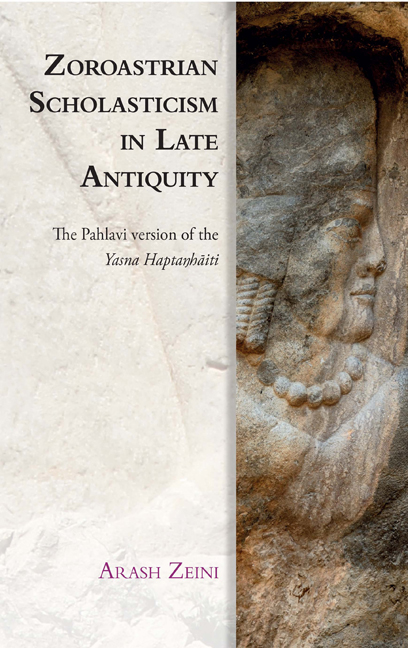Book contents
- Frontmatter
- Contents
- List of Figures
- List of Tables
- Acknowledgements
- Series Editor’s Preface
- Preface
- Conventions
- Abbreviations
- Dedication
- Part I Introduction
- 1 Introduction
- 2 The Zand
- 3 Scholasticism
- 4 Fire in Zoroastrianism
- 5 Precis: Yasn Ī Haft Hād
- Part II Text and translation
- 6 PY 35
- 7 PY 36
- 8 PY 37
- 9 PY 38
- 10 PY 39
- 11 PY 40
- 12 PY 41
- Part III Miscellaneous Observations
- 13 PY
- 14 PY 36
- 15 PY 37
- 16 PY 38
- 17 PY 39
- 18 PY 40
- 19 PY 41
- Part IV Epilogue
- 20 Reflections on the Zand
- Appendices
- Appendix A Transliteration and Apparatus
- Appendix B Y 9.1
- Appendix C Fire in the Older Avesta
- Appendix D Iϑā
- Appendix E MSS Concordance
- Bibliography
- Index of Passages Quoted
14 - PY 36
Published online by Cambridge University Press: 14 October 2020
- Frontmatter
- Contents
- List of Figures
- List of Tables
- Acknowledgements
- Series Editor’s Preface
- Preface
- Conventions
- Abbreviations
- Dedication
- Part I Introduction
- 1 Introduction
- 2 The Zand
- 3 Scholasticism
- 4 Fire in Zoroastrianism
- 5 Precis: Yasn Ī Haft Hād
- Part II Text and translation
- 6 PY 35
- 7 PY 36
- 8 PY 37
- 9 PY 38
- 10 PY 39
- 11 PY 40
- 12 PY 41
- Part III Miscellaneous Observations
- 13 PY
- 14 PY 36
- 15 PY 37
- 16 PY 38
- 17 PY 39
- 18 PY 40
- 19 PY 41
- Part IV Epilogue
- 20 Reflections on the Zand
- Appendices
- Appendix A Transliteration and Apparatus
- Appendix B Y 9.1
- Appendix C Fire in the Older Avesta
- Appendix D Iϑā
- Appendix E MSS Concordance
- Bibliography
- Index of Passages Quoted
Summary
In PY 36.1a, pad warzišn translates vərəzə̄nā, an instr.sg. of vərəzə̄na- ntr. ‘community’. The conventional explanation for this curious translation would be that here the exegetes interpreted vərəzə̄nā as a derivation from the verbal root varəz ‘ to practise’. However, pad warzišn seems to be motivated by the exegetes’ interpretation of (P)Y 36.
Derivations from both vərəzə̄na- and varəz occur a number of times in the YH. Two more forms derived from vərəzə̄na- are attested in (P)Y 35.7 and40.4, where loc.sg. vərəzə̄nē and acc.pl. vərəzə̄nā are both correctly rendered as wālunīh and wālun, respectively. All forms derived from the verbal root varəz are correctly rendered with warzīdan ‘ practise’.
Although PY 36.1a could be an exception to the otherwise correct translations of vərəzə̄na-, here pad warzišn is most likely an elliptic reference to humatān hūxtān huwarštān. As I discuss in Section 5.1.2, the commitment to the triad is of paramount importance in the (P)YH. Moreover, I hope to have shown that PY 36.5 refers to the three steps that are taken by the soul to reach the star, moon and sun stations (see Section 5.2.1). As we know, the three steps and stations correspond to humatān hūxtān huwarštān. Considering that the triad always occurs with the verb warzīdan (see Section 13.2.1), and that in PY 36.5 the fire is approached (be rasom) with (pad) the triad, I would like to suggest that PY 36.1a anticipates the end of this chapter in its first stanza by an encoded reference to the practice (warzišn) of humatān hūxtān huwarštān.
In PY 36.2c, kār ‘ affair’ translates yā̊ŋhąm, a gen.pl. of yāh- ntr. ‘supplication’. In her commentary on yāh-, Narten (1986: 149–55) dismisses Bartholomae's (1904: 1291) translation as ‘Krise, Entscheidung, Wendepunkt’, and in light of the eschatological expectation as ‘Schlußwerk’, in favour of ‘request’ (‘Bitte’). She argues that Bartholomae's suggestion may have been motivated by the term's Pahlavi translation, kār, which she considers weak and an indication of the difficulties the Pahlavi commentators must have faced translating yāh-: ‘[…], deren Blässe aber wohl ein Zeichen dafür ist, daß die Bedeutungsbestimmung des Wortes schon den Pahlavi-Theologen Schwierigkeiten bereitete, […]’ (Narten 1989: 150).
- Type
- Chapter
- Information
- Zoroastrian Scholasticism in Late AntiquityThe Pahlavi Version of the Yasna Haptaŋhāiti, pp. 204 - 216Publisher: Edinburgh University PressPrint publication year: 2020



